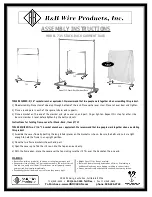
CM-IW200
Instruction Manual
3
Selecting an Installation Location
The iPort Control Mount is designed for use in normal interior environments. When
selecting an installation location for the Control Mount, please consider the following:
• Do not use the Control Mount outside or in a humid or wet environment. It is not
waterproof or water-resistant.
• The Control Mount cut-out must have enough depth within the wall cavity for the
Control Mount and its connections.
• The Control Mount has screw mounting holes on both sides that allow it to be
installed up against a stud.
• Check for a strong Wi-Fi signal at the mounting location using the iPod touch that is
to be installed in the Control Mount.
Control Mount Rear Connections
Audio Connector: RJ-45 jack connects to the audio wall plate via Cat5 cable. The
audio
connection transmits unbalanced audio to the audio wall plate. It also receives DC power
from the audio wall plate.
Wiring Cat5/RJ-45 Cable
The Cat5 cable and RJ-45 connector used in iPort installations must be wired according
to the T568A (“Straight-Through”) Standard with cables wired identically at both ends.
To prepare the Cat5 cable and RJ-45 connector for iPort installation:
1. Pull the Cat5 wire through the wall between
the desired locations.
2. Use a stripper or knife to strip about 1” of the
cable jacket off each end of the wire.
• Be careful not to nick any of the individual
wires.
3. Untwist the wire pairs and spread them flat.
Arrange them as shown in Figure 2.
4. Trim the ends of the individual wires to ½” in
length, making sure that they are even with
each other. Flatten the wires against each
other, leaving no space between them.
5. Hold the RJ-45 connector clip-side down and
insert the Cat5 wire ends firmly into the connector. Make sure that all the wires are flat all the way
to the very front of the connector.
6. Re-confirm that the color orientation matches the diagram and that cable jacket fits against the
connector stop.
7. Firmly crimp the RJ-45 connector with the crimp tool. Confirm that the connector is crimped firmly
and that all the wires are flat right up against the front of the connector. If even one of these wires
is incorrect, cut the connector off the cable and repeat steps 2 – 7 with a new RJ-45 connector.
Figure 2: RJ-45 Audio Connector






























